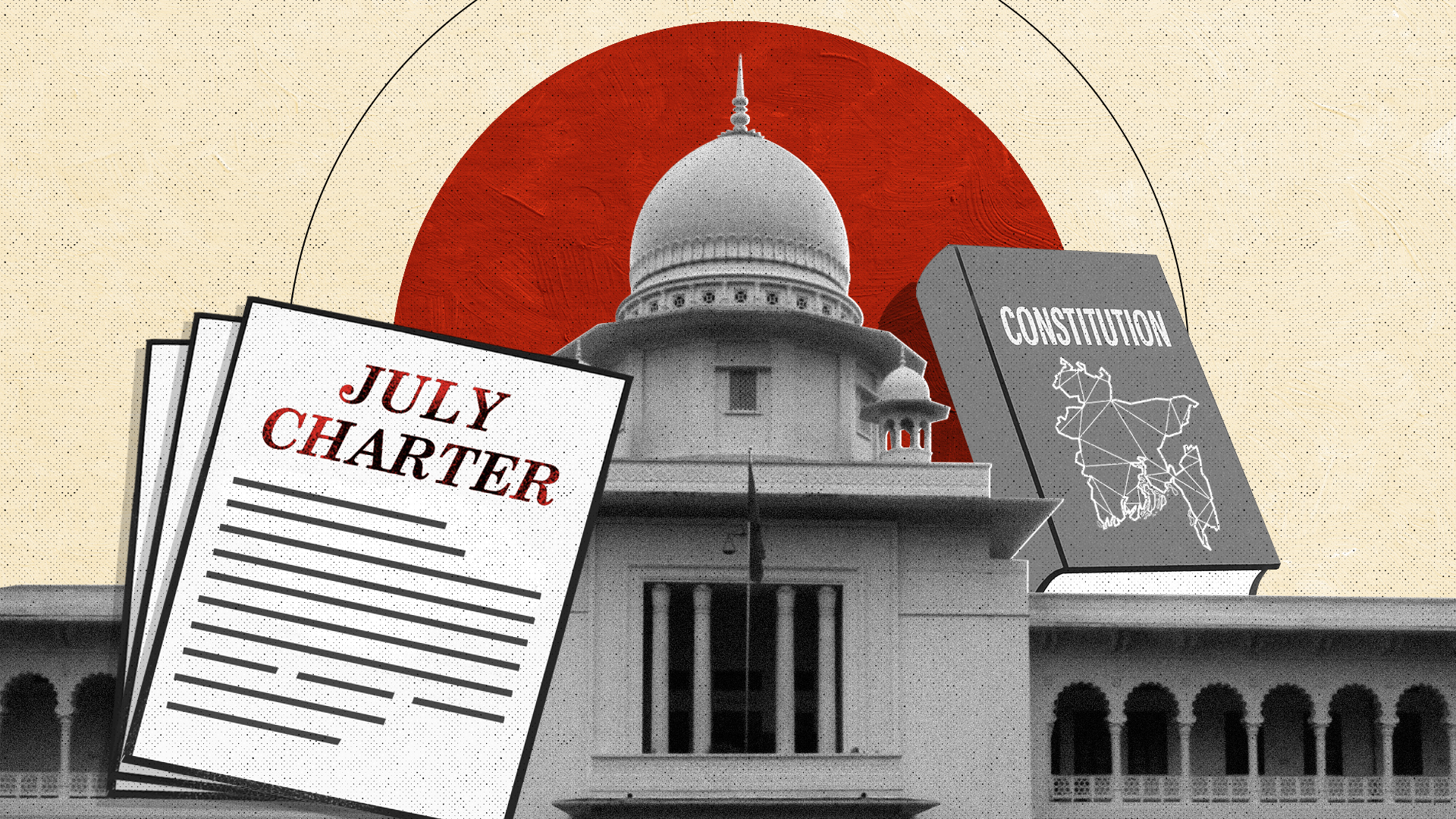How the consensus commission jeopardises the July charter

The recommendations made by the National Consensus Commission regarding the implementation of the July National Charter have failed to resolve the divisions surrounding its execution. In fact, the commission's recommendations have been criticised as being contradictory to the charter itself and undemocratic in nature. As a result, the overall implementation of the July charter now appears to be in jeopardy.
Determining the method for implementing the charter was never part of the National Consensus Commission's original mandate. However, following demands from several political parties—including Jamaat-e-Islami and the NCP—the commission began holding both formal and informal consultations with political parties and experts after July 31 to discuss how the charter could be implemented. Those discussions produced a general consensus in favour of holding a referendum. Yet, divisions remained over the legal basis, timing, and procedure of such a referendum.
It was expected that the National Consensus Commission would work with political parties to bridge these differences and offer a broadly acceptable recommendation. Instead, in its proposal submitted on October 28, 2025, the commission recommended that the constitutional reform proposals under the charter be implemented through a "July National Charter (Constitutional Reform) Implementation Order," based on which a national referendum would be held. If the referendum approved the proposals, the next parliament would act as a constitutional reform council to amend the constitution within 270 days, along with other normal legislation tasks. The commission, however, left it to the interim government to decide whether the referendum would be held before or on the day of the next parliamentary election.
Among the 84 reform proposals of the charter, the commission made two alternative recommendations concerning the 48 proposals related to constitutional reforms. Under the first option, the interim government would draft a constitutional amendment bill in line with those 48 proposals. If the referendum is passed with a "yes" vote, the Constitutional Reform Council would implement the proposals within 270 days. If it fails to do so within that time, the bill would automatically be deemed passed.
Under the second option, the commission did not suggest an automatic constitutional amendment. A referendum will be held on the 48 constitutional reform proposals, and if the outcome is positive, the Constitutional Reform Council will implement them accordingly.
Significantly, under both options, the dissenting opinions of political parties (notes of dissent) on the reform proposals would not be taken into account. Once the referendum passed, the constitutional reform proposals prepared by the commission would go to the reform exactly as drafted—irrespective of any dissent.
This recommendation by the National Consensus Commission has raised several serious questions and concerns about the future of the charter's implementation.
First, the commission's proposal directly contradicts the charter itself. The charter explicitly recognised the dissenting opinions of political parties, stating that these differences would be reflected in their electoral manifestos so that the public could express their preference through the ballot box, thereby giving the winning party a popular mandate to act on its stance. Yet, the commission's proposal ignores these dissenting opinions altogether. Instead of all 84 proposals—complete with differences—it has narrowed the package down to 48 proposals without mentioning any dissent by the political parties. If the referendum yields a "yes," those 48 reforms would be implemented exactly as the commission drafted them, with no room for variation. This directly contradicts the spirit and substance of the charter, which was painstakingly negotiated and signed after eight months of dialogue among the parties. In effect, the commission has disowned its own eight months of work.
Second, if the intention was to go directly to the people for approval, bypassing the political parties' consensus, why limit the referendum to only the 48 constitutional proposals? Why not hold a referendum on the recommendations of all eleven reform commissions? Why not include the proposals from the labour, health, women, or media reform commissions as well? On what authority did the commission decide that only the constitutional reforms required public approval, while others did not?
Third, the 48 constitutional reform proposals were the subject of lengthy negotiations and debates among political parties, during which full consensus was not achieved. Parties agreed on some issues but disagreed on others. Now, asking the general public to give a simple "yes" or "no" verdict on the entire package raises a serious question of logic and fairness. Just as political parties differ on individual issues, ordinary citizens, too, may agree with some proposals and disagree with others. How, then, can they meaningfully vote on an entire package in a single word—yes or no? Moreover, have citizens been adequately informed about the details, implications, and trade-offs of these reforms? Isn't this rather like putting students into an exam without teaching them the syllabus?
Fourth, the recommendation that the constitutional amendments would automatically take effect if not implemented within 270 days is fundamentally undemocratic. Such a top-down, automatic imposition is unacceptable, especially coming from a body formed to promote democratic transition and consensus-based reform.
Fifth, by excluding the dissenting opinions from the charter, the commission may have jeopardised the entire reform process. Political parties may now campaign against the referendum package in its entirety, using their disagreements as justification. For example, suppose Party A strongly opposes proportional representation in the upper house. If the referendum passes, that system would become binding. Hence, Party A might urge its supporters to vote "no" to block the entire package. Party B might oppose changes to the constitution's founding principles and therefore campaign against the referendum. Party C might reject the mandatory increase of female candidates by five percent per election and take a similar stance. Thus, each party, to safeguard its particular objections, could oppose the entire reform package—and they could hardly be blamed for it.
Had the referendum included the dissenting opinions, those same parties could have voted "yes" and then pursued their specific commitments once in power. Now, because of the commission's reckless recommendation, not only have the dissenting views been discarded, but even the agreed reforms are at risk.
One may disagree with some of the political parties' dissenting opinions in the charter. But that does not justify forcing or manipulating the reforms. Reforms imposed through coercion or technical manoeuvering never endure and such top-down reforms inevitably fail. Sustainable reform can only be achieved through genuine political will and broad-based consensus.
Therefore, the focus should be to prioritise and implement those reforms on which political consensus already exists. Any attempt to impose or shortcut the process from above only endangers the entire reform project and undermines the democratic spirit that the July National Charter was meant to uphold.
Kallol Mustafa is an engineer and writer who focuses on power, energy, environment, and development economics. He can be reached at kallol_mustafa@yahoo.com.
Views expressed in this article are the author's own.
Follow The Daily Star Opinion on Facebook for the latest opinions, commentaries and analyses by experts and professionals. To contribute your article or letter to The Daily Star Opinion, see our guidelines for submission.




 For all latest news, follow The Daily Star's Google News channel.
For all latest news, follow The Daily Star's Google News channel. 


Comments